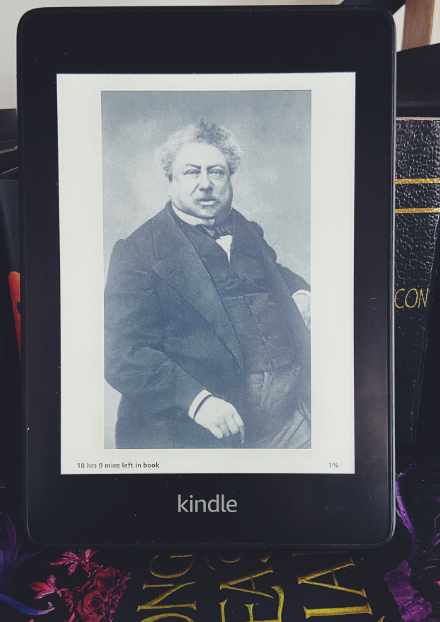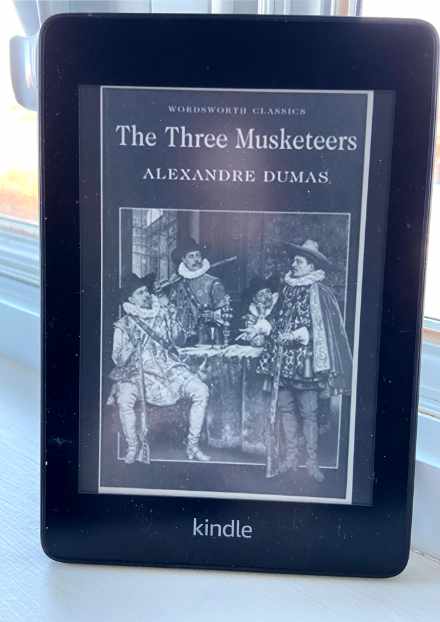All for one and one for all, united we stand and divided we fall.
An iconic quote from an iconic story, The Three Musketeers by Alexandre Dumas. For Black literature month, I’m diving into one of the most celebrated French novels of all time, it’s been adapted for film, television and the stage countless times. It’s popularity has lasted through the ages, and it doesn’t seem to be losing steam, with an apparent new Netflix adaptation on the horizon.
After this adventure epic came The Count of Monte Cristo, a behemoth of a revenge novel completely worthy of the love that it gets to this day. Edmond Dantes clawing his way to freedom and retribution has resonated with readers across the world.
I should clarify my earlier statement – I won’t be diving into the novels themselves so much as their author. Alexandre Dumas the man is often forgotten, despite the popularity of his works. Having had such an influence on French literature – literature around the world really – he’s an important man to remember and to celebrate. Alexandre Dumas led a fascinating life on and off the page. Time to take a dive into his life and legacy…
Alexandre Dumas’ Beginnings

Born in July of 1802, Alexandre Dumas was originally born Dumas Davy de la Pailleterie. This name appears to have been in reference to his grandmother Marie-Cessette Dumas, a slave from Saint-Domingue (now Haiti). His mother Marie-Louise Elisabeth Labouret Dumas was the daughter of an Innkeeper, and his father Thomas-Alexandre Dumas was a general during the French Revolution. In fact, Thomas-Alexandre was one of the only high ranking members of the military, rising to the rank of general-in-chief in 1793 and being the first Black man to do so. He wouldn’t be outranked until 1975, when Daniel James Jr. became a four star general in the U.S. Air Force.
Dumas’ father passed away from stomach cancer in 1806 leaving his wife, son and two daughters in quite the pinch. Thomas-Alexandre had had some severe clashes with Napoleon Bonaparte throughout the Revolution, with the commander putting an end to his career. His military pension was never paid out to him, and the young Alexandre was unable to even have a high school level education. However, that doesn’t mean that he wouldn’t gain any knowledge or information. His mother was determined to keep her husband’s memories alive, and would often tell her son stories about his father’s adventures and exploits. It seems that he may have been quite inspired by his fathers life and legacy, as seen from his later works.
Publishing Career
Alexandre Dumas began his writing career at a young age working for Louis-Philippe I, King of France. He wrote several well received plays before he was 30 years old, giving him the opportunity to write full time. On the coattails of his success with the theatre Dumas turned his attention to novels, publishing his first serial novel Le Capitaine Paul in 1838 which he’d re adapted from a previous play of his.

Between 1839 and 1843 Alexandre Dumas published several stories, essays and novels, with titles such as The Fencing Master and Georges being published during this period. In 1844, Dumas published The Three Musketeers, his first of The D’Artagnan Romances and the most popular of them. He also began his publication of The Count of Monte Cristo, which was published as a serial in eighteen parts until 1846. Both were heavily inspired by his father, with the Musketeers adventures taking center stage, and Edmond Dantes (Monte Cristo) and his imprisonment mirroring his fathers’ own experience when he was held in an Italian prison for several years.
While all of this was happening, Dumas would marry Ida Ferrier, an actress, in February of 1840. However, this did not deter him from being the ladies man that he was known to be. Alexandre would father four children with four of the women that he associated with. Side note – his son, known as Alexandre Dumas fils, would also go on to be a successful playwright himself. Scholars have estimated that Dumas could have had up to forty mistresses throughout the course of his life. This was a less than stellar fact to discover, however this would have been quite the norm at the time within the aristocracy – busy guys.
Alexandre Dumas and His Legacy

His works are legendary and have stood the test of time, but Dumas’ life and ancestry itself often seem to be pushed to the background. In fact, in doing some research for this article there is little mention of his Black heritage. The aristocracy at the time, as well as famous published authors were largely white, and Dumas would have stood apart from the crowd. He was faced with many critics who focused on his race as opposed to his writing – certainly not the only time that would happen to an author of color. I believe that it’s important to be aware of his background as well as his literature itself, and the ground that he was breaking at the time should be applauded.
In 2002 Alexandre Dumas’ ashes were re-interred at the Mausoleum in the Pantheon de Paris in acknowledgement of his many contributions to the literary and French community. At the time of the ceremony, President at the time Jacques Chirac acknowledged that racism in France at the time was one of the reasons that Dumas was not honored in the way that he should have been. In the past several decades scholars have also discovered lost works of Dumas
It’s no secret that Alexandre Dumas has had a lasting impression on the world of literature. His characters and narratives have captured the attention of many people around the world, and I don’t believe that their popularity will fade any time soon. I for one can’t wait to see what sorts of interpretations of his work we see next.
















